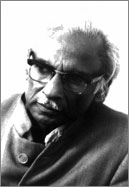|
|
 |
Awadh Kishore Saran (1922-2003), who wrote under the name A. K. Saran, was an Indian scholar, editor, and writer and one of the most important voices in the Hindu world on traditional thought. A. K. Saran's writings often covered the expositors of traditional teachings and the perennial philosophy such as Frithjof Schuon, and particularly Ananda K. Coomaraswamy, whose writings Saran first encountered when he was ten. Saran's books include Hinduism in Contemporary India, Illuminations, On the Intellectual Vocation, On the Theories of Secularism and Modernization, Traditional Vision of Man, Traditional Thought, and Sociology of Knowledge and Traditional Thought. Much more biographical information on A.K. Saran can be found on his official web site (click here to go to the web site in a new tab or window).
A.K. Saran wrote two articles that appeared in Studies in Comparative Religion: The Crisis of Hinduism (Spring, 1971), and Gandhi’s Theory of Society and Our Times (Autumn, 1969).
|
|
|
|
 |
Mouse over this icon to see the abstract of the article. |
• Click on the header on any column to sort.
• Click on an issue listing (e.g. "Vol. 1, No. 1. ( Winter, 1967)" ) to see the full contents of only that issue.
|
| Article |

This article relates the situation of Hinduism in India as it has come in contact with modernism and Islam. The result of these two influences on Hindu culture has had an inevitably threatening result on Hindu religion. Saran emphasizes the impossibility of the privatization of religion in the Hindu tradition as it has been implied by secular and outside social influences. In addition to modernism and Islam, Saran also discusses the implications of British colonial rule and Christianity as these also limited the sustainability of the Hindu tradition. He questions the compatibility of Hindu principles with the ideas of social reform introduced by western ideals and industries in part because this synthesis of society overturns the doctrine of karma that is central to Hindu belief.
| The Crisis of Hinduism | Saran, A.K. | |
Vol. 5, No. 2. ( Spring, 1971)
| Hinduism |
| Article |

Saran discusses the revolution that Gandhi caused within the schism of the ‘freedom-cum-nationalist movement’ in India; how Gandhi went about changing the foundation, goals and nature of the freedom movement and the effects this had both on the movement and on the spiritual revival within India. According to Saran, “Gandhi changed the nature of Indian politics by spiritualizing it.” Saran goes on to investigate the meaning and philosophy behind Gandhi’s life and works, contrasting this philosophy with the modern world which Gandhi attempted to combat.
| Gandhi's Theory of Society and Our Times | Saran, A.K. | |
Vol. 3, No. 4. ( Autumn, 1969)
| Hinduism |
|
2 entries
(Displaying results 1 - 2)
|
View : |
|
 |
Loading... |
|
Page:
[1]
of 1 pages
|
|
|
|